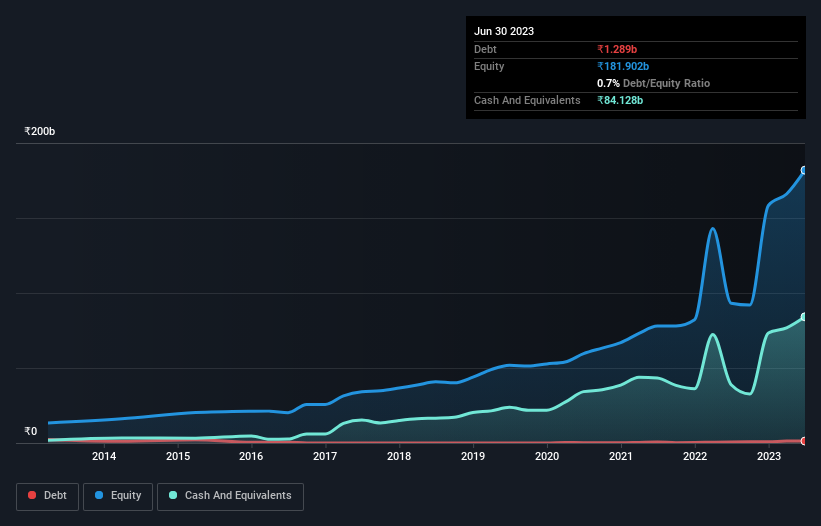
The external fund manager backed by Berkshire Hathaway's Charlie Munger, Li Lu, makes no bones about it when he says 'The biggest investment risk is not the volatility of prices, but whether you will suffer a permanent loss of capital.' So it might be obvious that you need to consider debt, when you think about how risky any given stock is, because too much debt can sink a company. We note that LTIMindtree Limited (NSE:LTIM) does have debt on its balance sheet. But the real question is whether this debt is making the company risky.
Why Does Debt Bring Risk?
Generally speaking, debt only becomes a real problem when a company can't easily pay it off, either by raising capital or with its own cash flow. Ultimately, if the company can't fulfill its legal obligations to repay debt, shareholders could walk away with nothing. While that is not too common, we often do see indebted companies permanently diluting shareholders because lenders force them to raise capital at a distressed price. Of course, the upside of debt is that it often represents cheap capital, especially when it replaces dilution in a company with the ability to reinvest at high rates of return. The first thing to do when considering how much debt a business uses is to look at its cash and debt together.
Check out our latest analysis for LTIMindtree
What Is LTIMindtree's Net Debt?
As you can see below, at the end of June 2023, LTIMindtree had ₹1.29b of debt, up from ₹690.0m a year ago. Click the image for more detail. However, it does have ₹84.1b in cash offsetting this, leading to net cash of ₹82.8b.

A Look At LTIMindtree's Liabilities
The latest balance sheet data shows that LTIMindtree had liabilities of ₹52.3b due within a year, and liabilities of ₹13.0b falling due after that. Offsetting this, it had ₹84.1b in cash and ₹74.3b in receivables that were due within 12 months. So it can boast ₹93.1b more liquid assets than total liabilities.
This surplus suggests that LTIMindtree has a conservative balance sheet, and could probably eliminate its debt without much difficulty. Simply put, the fact that LTIMindtree has more cash than debt is arguably a good indication that it can manage its debt safely.
On top of that, LTIMindtree grew its EBIT by 93% over the last twelve months, and that growth will make it easier to handle its debt. The balance sheet is clearly the area to focus on when you are analysing debt. But ultimately the future profitability of the business will decide if LTIMindtree can strengthen its balance sheet over time. So if you want to see what the professionals think, you might find this free report on analyst profit forecasts to be interesting.
Finally, while the tax-man may adore accounting profits, lenders only accept cold hard cash. While LTIMindtree has net cash on its balance sheet, it's still worth taking a look at its ability to convert earnings before interest and tax (EBIT) to free cash flow, to help us understand how quickly it is building (or eroding) that cash balance. During the last three years, LTIMindtree produced sturdy free cash flow equating to 51% of its EBIT, about what we'd expect. This free cash flow puts the company in a good position to pay down debt, when appropriate.
Summing Up
While it is always sensible to investigate a company's debt, in this case LTIMindtree has ₹82.8b in net cash and a decent-looking balance sheet. And it impressed us with its EBIT growth of 93% over the last year. So we don't think LTIMindtree's use of debt is risky. When analysing debt levels, the balance sheet is the obvious place to start. However, not all investment risk resides within the balance sheet - far from it. We've identified 4 warning signs with LTIMindtree (at least 2 which are a bit unpleasant) , and understanding them should be part of your investment process.
At the end of the day, it's often better to focus on companies that are free from net debt. You can access our special list of such companies (all with a track record of profit growth). It's free.
New: AI Stock Screener & Alerts
Our new AI Stock Screener scans the market every day to uncover opportunities.
• Dividend Powerhouses (3%+ Yield)
• Undervalued Small Caps with Insider Buying
• High growth Tech and AI Companies
Or build your own from over 50 metrics.
Have feedback on this article? Concerned about the content? Get in touch with us directly. Alternatively, email editorial-team (at) simplywallst.com.
This article by Simply Wall St is general in nature. We provide commentary based on historical data and analyst forecasts only using an unbiased methodology and our articles are not intended to be financial advice. It does not constitute a recommendation to buy or sell any stock, and does not take account of your objectives, or your financial situation. We aim to bring you long-term focused analysis driven by fundamental data. Note that our analysis may not factor in the latest price-sensitive company announcements or qualitative material. Simply Wall St has no position in any stocks mentioned.
About NSEI:LTIM
LTIMindtree
A technology consulting and digital solutions company, provides information technology services and solutions in India, North America, Europe, and internationally.
Excellent balance sheet with moderate growth potential.


